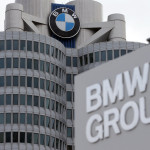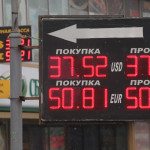German Business Confidence Rebounds to 1-1/2-year High
Berlin (dpa) – German business confidence hit its highest level in more than one and half years in November, rebounding more strongly than forecast on expectations that Europe’s biggest economy will expand.
The indicator measuring the mood in boardrooms jumped to 109.3 points this month after it slumped to 107.4 points in October, the Munich-based Ifo economic institute said on Friday.
“The German economy looks ahead to the winter months with confidence,” said Ifo chief Hans-Werner Sinn.
“Manufacturers’ business expectations were clearly more optimistic and they expect stronger impulses from exports,” he said.
Analysts polled by dpa-AFX had expected the index, which is based on a survey of about 7,000 companies, to nudge up to 107.7 points in November.
The closely watched index now stands at its highest level since April last year, as a result confirming Germany’s role as the key drive force behind economic growth in the 17-member eurozone.
“The Ifo readings do not only bode well for the German economy. It is also great news for the rest of the eurozone,” said ING Bank’s chief German economist Andreas Rees.
“Given close trade linkages between Germany and major currency bloc countries like France and Italy, significant trickle-down effects will be
Prof. Dr. Kai CARSTENSEN of the Ifo Institute in Munich is among the five scientists who studied a forecast of economic growth for 2013 in the Federal Press Conference — photo: dpa
arriving in the next few months,” he said.
The positive signs for the nation’s economy are also a boost for German Chancellor Angela Merkel as she prepares to begin a third term in office in a possible coalition with the main opposition Social Democrats.
“Contrary to most other governments in the eurozone, the next German government will not have to start domestic crisis management but could and should use the good economic times to prepare the economy for the future,” said ING economist Carsten Brzeski.
Still, gross domestic product (GDP) data also released Friday by Germany’s statistics office confirmed that the economy slowed in the third quarter despite a strong pickup in both corporate investment and government spending.
The nation’s economy expanded by a modest 0.3 per cent quarter on quarter during the three months to the end of September, down from 0.7 per cent in the second quarter, the statistics office said releasing a detailed breakdown of figures it published last week.
“Positive contributions in the third quarter were made exclusively by domestic demand,” the statistics office said.
In particular, this included a 1.6-per-cent quarter-on-quarter gain in gross fixed capital with investment in machinery and equipment rising by 0.5 per cent.
Investment by construction companies jumped by 2.4 per cent as the building industry continued to recover from a downturn at the start of the year, the statistics office data showed.
Government spending was up 0.5 per cent, while consumer spending edged higher by 0.1 per cent.
Trade, however, acted as a drag, with imports growing by 0.8 per cent and at a much faster pace than exports, which increased by just 0.1 per cent, the statistics office said.
The Ifo index’s gain in November followed a rise in both industry’s assessment of current business conditions and the nation’s prospects six months down the track.
While the survey indicator measuring current business conditions rose from 111.3 points in October to 112.2 in November, the indicator measuring expectations jumped from 103.7 to 106.3.







 Euro Converter
Euro Converter